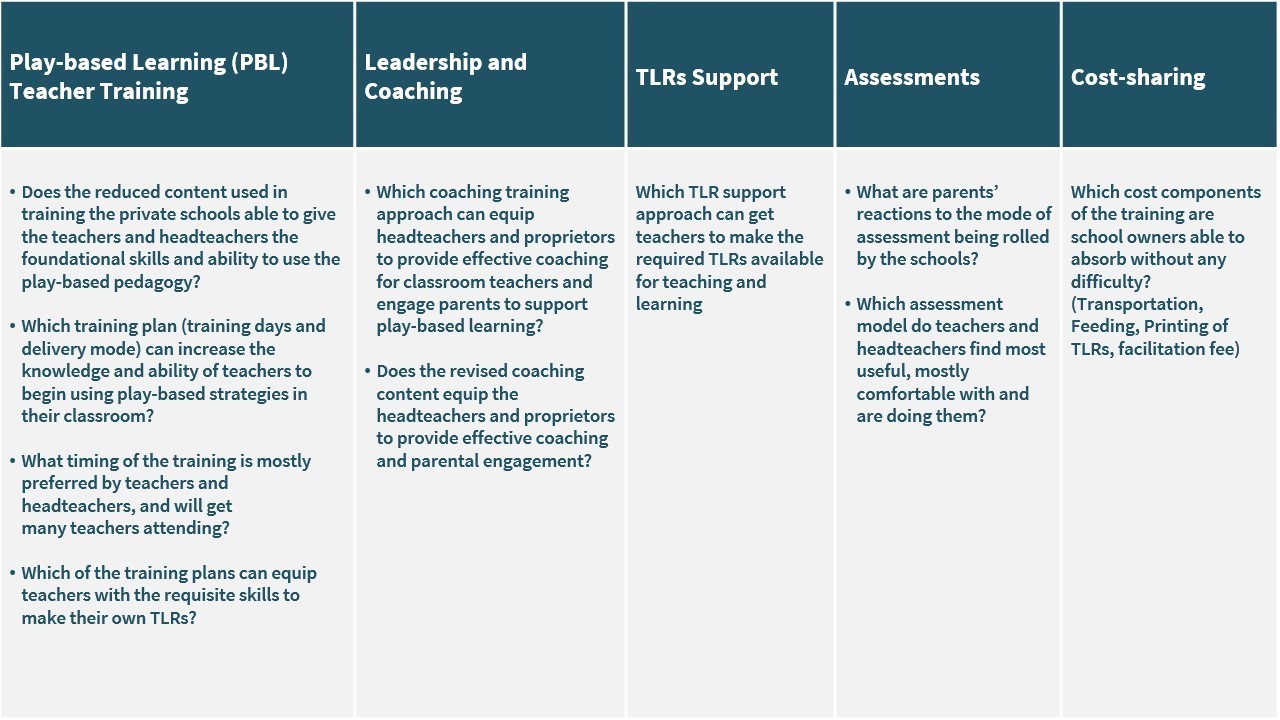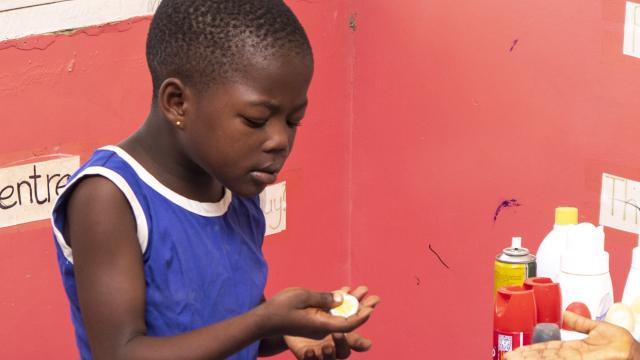In 2023, Sabre Education started scaling its In-service Teacher Training (INSET) model from public to affordable private schools (APS), but their scoping study revealed key regulatory and operational differences between the two sectors. To understand the best approach to adapt their public-school model in the targeted environment, Sabre Education conducted a pilot program on variations of the components of their solution in selected affordable private schools in Ghana. For organisations targeting APS, we explore the pilot and key insights gained by Sabre Education in this article.
An Overview of the Pilot
Sabre’s In-service Teacher Training (INSET) successfully prepared public school teachers to design their classrooms and instruct kindergarten students using play-based learning. To fulfil its planned scale to APS, Sabre Education partnered with the District Education Director of Gomoa Central to equip private schools in its district with play-based pedagogical skills. The organisation used this avenue to onboard 13 medium-low and low-fee private schools in the district for a pilot program and grouped them across 3 variations. The variation components and groups are shown below.

The pilot's main objective was to identify an In-service teacher training (INSET) Model best suited for low-fee private schools across the variations. This meant highlighting the combination of approaches across the variations best suited for medium – low-fee private schools to improve learning outcomes. To accomplish this, Sabre used the pilot to answer scale-related questions they developed in the following areas:

The pilot began with play-based learning (PBL) training. 36 teachers, 6 headteachers, and 8 proprietors attended three training cohorts. The pre-training and post-training survey showed that Variation 1 teachers had a higher positive change (+38%) in knowledge compared to +31% and 15% for Variations 2 and 3, respectively. Additionally, Teaching and Learning Resources were provided according to each variation.
Leadership and In-Class Coaching training to Headteachers and Proprietors followed the PBL training after 3 weeks. The headteachers and proprietors were required to coach their teachers after the sessions. Only Variations 2 and 3 received the training. The assessment revealed that a higher percentage of teachers in variation 1 and 2 classrooms actively reminded their learners of the classroom rules compared to teachers in variation 3 classrooms. The diagram below visualises the various aspects Sabre assessed the teachers.

Sabre’s Learnings from the Pilot
After analysing the pilot’s results, Sabre Education gleaned several key insights. We shared some below:
- Training medium: Sabre Education found that face-to-face training (both PBL and Leadership Coaching) yielded better results compared to the online approaches, particularly for groups of teachers or headteachers with limited education backgrounds.
- Teaching and Learning Resources: Teachers without appropriate TLRs struggled with classroom control when enacting PBL in the classroom. All teachers must have access to hardcopy TLRs and spend time making them for teaching and learning. The low scores obtained by Variation 3 teachers in Teacher Monitoring and spot-check assessments were attributed to the delays in printing and making their TLR templates which led to ineffective use of the play-based methodology in the classrooms.
- Time Constraints: Many headteachers in pilot private schools doubled as teachers in the same KG or the upper classes. This situation hinders their ability to allocate time and resources for in-class coaching support for their colleagues in the KG classrooms. The Proprietors are mostly absent in the schools. A hybrid coaching approach involving external coaches could be explored at a fee to the schools.
- Stakeholder Commitment: The successful implementation of the play-based methodology in private schools relies heavily on the dedication and commitment of both teachers and headteachers and support from proprietors/proprietress, the resources available, and the individual perspectives and beliefs of the teachers themselves about play-based methodology and its benefit to their learners in their classrooms.
- Cost Sharing: Private schools may afford to absorb their transportation costs as part of their contribution to cost sharing. Schools are also required to provide associated resources such as glue, scissors, crayons, cards, etc that are necessary for the making of the TLRs should also be provided to these school. Other costs are borne by Sabre Education.
- Parental Engagement: Parental engagement is very crucial in the implementation of the play-based methodology therefore future projects should encourage headteachers to engage parents in the implementation at the start of the project.
Conclusion
For Sabre Education, the recent pilot provided clearer context on the stakeholders, costs, and implementation constraints in the private school settings. These insights are valuable for other organisations scaling to similar settings. Sabre Education has lined up another pilot to test an updated adaptation of their solution for a full academic session, extended from the single academic term used for the pilot above. Pilots have been major drivers of Sabre Education's scale journey in the private sector. They give invaluable insights when organisations are scaling to new contexts while also limiting the risk exposure of resources committed to the scaling process.
Related Tools in Scale Toolkit

